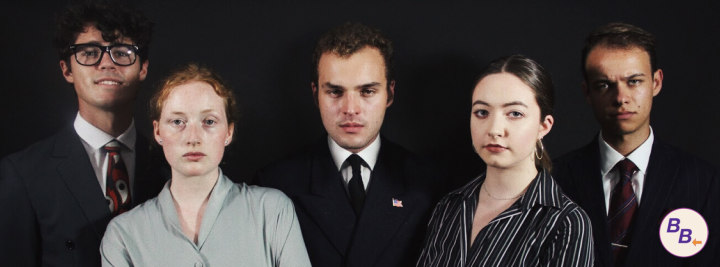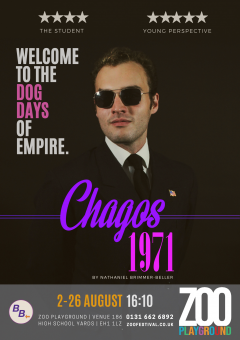A Director's Take - Chagos 1971
Following shows such as Mack The Knife in 2017 and last year's Technicolor, Black Bat Productions are back at the Festival Fringe with a new show. Chagos 1971 is a biting political comedy surrounding an unbelievable decision made in the Foreign Office in April 1971. Written and directed by recently graduated student Nathaniel Brimmer-Beller, and starring University students past and present, the show will be performed throughout August at the ZOO Playground in the University's High School Yards. We spoke to Nathaniel about his latest production.

This year’s production, Chagos 1971, is described as a comedic dark comedy, with your past productions being similarly described. Can you describe your compulsion towards this genre?
This genre is far and away my favorite kind of story. Comedies have a way of exploring issues and topics by getting the audience’s guard down, which is an invaluable tool when trying to make a point about more or less anything. Every one of my plays is meant to be a piece of entertainment and high style just as much as it is meant to highlight some lamentable inconsistencies and assumptions in societies old and new. The darker side of these plays also allows us to push the envelope even more. Much has been made of the thrilling possibilities that theatre grants us to explore violence and cruelty, and I have always tried to include some element of those subjects into my stories.
The fun part is combining the darkness and the entertainment — I find it jars the audience in just the right way, so though people are having a good time, laughing and enjoying the aesthetics, they’re also braced for something exciting or shocking to happen at any time. This approach also strikes me as a much more interesting option than straightforward drama. Rarely, in my opinion, does a straight drama making a Serious Point actually say anything particularly new or exciting. Plenty of great works of art are dour and serious, but even more have some cheek, wit, or element of satire bouncing around in there somewhere. That’s the part I like to pick up and run with.
Your previous plays have all been set across the twentieth century – what is it about 1971 that the play is interested in and where did your inspiration come from?
Yeah I’ve now written and directed plays set in the 30s, 40s, 50s, 60s, and 70s while at uni, so you’re definitely onto something. It just interests me to no end how we can relate different parts of the twentieth century to our modern situation. The 1970s left an unforgettable stylistic impression, on fashion, music, politics, sexuality, you name it. It’s a decade that I grew up romanticizing, as my dad played me the best 70s rock and roll all the time and my mom would describe the fashion and disco scenes she grew up in. Incredible stories, set in an incredible and incredibly different world.
But as I looked more and more into the art being made and the emotions being expressed at the beginning of the decade, in 1971 particularly, I was struck by how dark it all was. Sure, plenty of 60s fun was still chugging away in the pop charts, but songs like “What’s Going On,” “Ball of Confusion,” “You Make Your Own Heaven and Hell Right Here on Earth,” “Home is Where the Hatred Is” and more were conjuring remarkably dark interpretations of the world as it was and as it would continue to be. This is the central part of the era I hooked on. What was making the general tone darken like this? Lofty ambitions sagging under political realities? Peace and love being sidelined as haunting wars broke out? All the while, London sat on a mostly deflated empire, Enoch Powell’s words still ringing in a lot of people’s ears. There’s a lot of beauty in 1971, as even the darkest music and art was brilliantly crafted, but there’s far more darkness than I had initially realized. The play’s jaunty tone when depicting devastating subject matter is meant to reflect all these remarkable juxtapositions.

With a cast of current and recently graduated University students, tell us about some of the talent you have cast in this year’s production and the characters they are depicting.
We have a delightful array of performers in the mix once again — one of the best things about Edinburgh is that when you put out the call for talented young actors, you will find some seriously talented young actors. Our cast can prove it. Two of the characters involved in the show are real people, quite notable real people actually: Governor Bruce Greatbatch, who presided over the Seychelles during this period, and more famously, Admiral Elmo “Bud” Zumwalt, the head of the U.S. Navy and a well-known and beloved figure in American military history. The actors playing these two, Michael Zwiauer and Angus Bhattacharya, have done an outstanding job of combining the gravity of playing a real person with the quickness and absurdity necessary to fit these men into a breakneck-speed comedy like this one. Of course, given their involvement in the real-life decisions shown in the play, they do not come off very well; it’s a marvel to watch these guys paint their characters with personality and inner complexity, all while making everyone guffaw, and occasionally recoil.
As for the fictional characters, we have a cast that has brilliantly taken to the tone and attitude of the show to make their performances pop. Giorgio Bounous and Katrina Johnstone embody hopelessly bureaucratic Foreign Office representatives Terry Douglas and Sarah Yerland with all the spike-tongued ferocity and cutthroat unprofessionalism of a Thick Of It script; Sophie Boyle, returning for a second year with Black Bat after Technicolor last year, embodies her above-it-all character of Gretchen Specter, Greatbatch’s assistant who knows more about his job than he ever could, with an electric drive and candor. And Patrick Hall, playing Dispatch, the stand-in for every woefully disrespected government stooge/intern, has an unforgettable way of dashing around as underlings do, and illustrating his dedication to the job, even as it treats him pretty badly. Marina Jodrell, Maaz Abdelrahman, and Mica Anderson (who is also returning after Technicolor) bookend the story with a few characters best left as a surprise to each audience — these three deftly illustrate the outside world’s vulnerability to the kinds of meetings held during the rest of the play, while offering a taste of a different approach to the play’s larger questions altogether. You’ll see how.
How far is your work influenced by the time you have spent at University, such as your involvement with the Edinburgh University Theatre Company at Bedlam?
Very much. A lot of my inspiration for the crushing levels of extreme bureaucracy you can see in the show came directly from my time as an elected member of various society committees. In fact a few of the conversations in the show use language directly lifted from some of the meetings I experienced here, and without that experience I don’t think I would have believed people could be as callous and neurotic in these situations as they sometimes are. So in a way I’m grateful for all that absurdity because it led to this play.
Other than that, yes, I have found my work is influenced by the extremely creative group of people in the Edinburgh theatre scene — seeing each others’ work regularly has made for an excellent forum of encouragement and development, where disagreements as well as agreements over theatrical approach and quality can lead to incredible bursts of inspiration. I will very much miss that side of Bedlam and all these societies — it feels like there is really nowhere like this churning out student theatre with the drive, passion, and inventiveness you can find here. In another sense altogether, my time at Edinburgh has regularly caused me to evaluate how my American identity and British identity butt up against each other — the play has a few quite barbed commentaries about how I’ve found Americans and British do and do not see eye to eye, and what we each could work on in our respective societies, then and now.
Do you have any other recommendations for this year’s Festival Fringe?
One above all: Eric André at Gilded Balloon. Couldn’t be more excited. He’s my hero.
In one sentence, tell us why people should come and see Chagos, 1971.
You have never seen a dark comedy so political, a political comedy so dark, or a dark political story so funny. Come on down!
Chagos 1971 is running August 2-7, 9-14, 16-21 and 23-26 at 4.10pm. Tickets are available to buy now.
http://blackbatproductions.mystrikingly.com/

